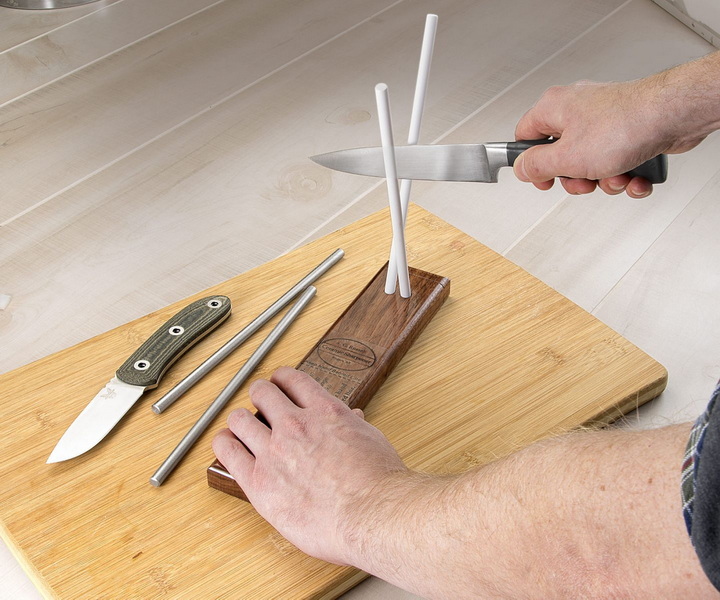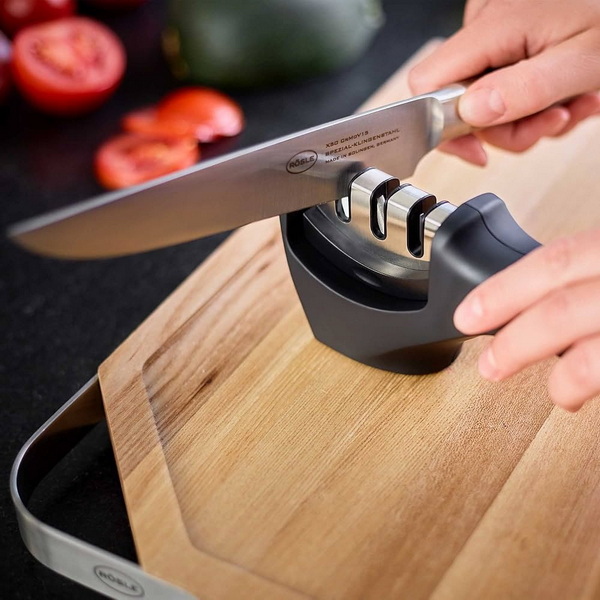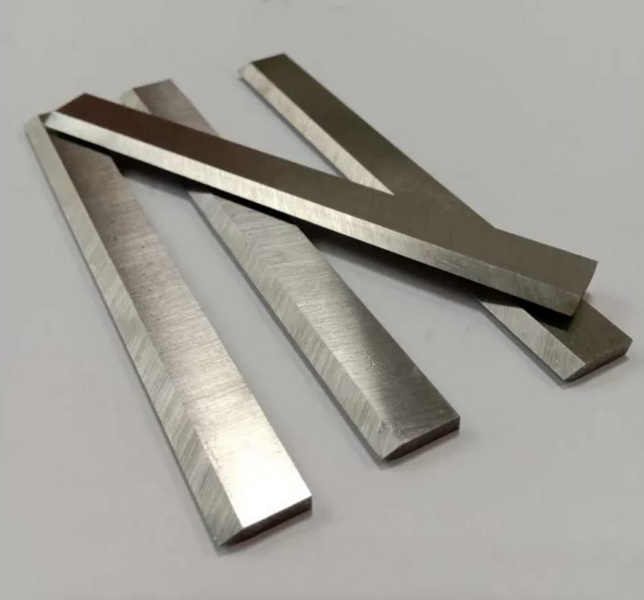Content Menu
● Introduction to Tungsten Carbide Sharpeners
>> Key Features of Tungsten Carbide
● Using a Tungsten Carbide Field Sharpener
>> Step-by-Step Instructions
>> Tips for Effective Sharpening
● Safety Precautions
● Choosing the Right Tungsten Carbide Sharpener
>> Comparison of Different Sharpeners
● Advanced Techniques for Sharpening
>> Adjusting the Angle
>> Sharpening Serrated Knives
>> Sharpening Other Tools
● Maintenance and Care
>> Clean Regularly
>> Store Properly
>> Replace Sharpening Elements
● Common Mistakes to Avoid
● Practical Applications of Sharp Knives
>> Cooking
>> Outdoor Activities
>> Crafting and DIY Projects
● Conclusion
● FAQs
>> 1. What is the best way to clean a tungsten carbide sharpener?
>> 2. Can tungsten carbide sharpeners be used for serrated knives?
>> 3. How often should I sharpen my knife with a tungsten carbide sharpener?
>> 4. Are tungsten carbide sharpeners suitable for all types of steel?
>> 5. Can I sharpen other tools with a tungsten carbide sharpener?
● Citations:
Tungsten carbide field sharpeners are versatile tools designed to sharpen knives and other blades efficiently, making them ideal for both outdoor enthusiasts and everyday users. These sharpeners utilize tungsten carbide, a material renowned for its hardness and durability, allowing for quick and effective sharpening of blades. In this article, we will explore how to use a tungsten carbide field sharpener effectively, along with tips and precautions to ensure optimal results.

Introduction to Tungsten Carbide Sharpeners
Tungsten carbide sharpeners are engineered to provide a balance of sharpness, durability, and ease of use. They are particularly effective for sharpening knives with straight or serrated edges, although some models may not be suitable for serrated blades. The key components of these sharpeners include tungsten carbide sharpening elements, which are often V-shaped to facilitate sharpening at a consistent angle.
Key Features of Tungsten Carbide
- Hardness: Tungsten carbide is extremely hard, with a Mohs hardness of 8.5-9, making it ideal for sharpening softer metals like steel.
- Wear Resistance: It offers high wear resistance, ensuring that the sharpening elements remain effective over time.
- Thermal Stability: Tungsten carbide maintains its structural integrity even under high temperatures, which is beneficial for high-speed sharpening operations.
Using a Tungsten Carbide Field Sharpener
Step-by-Step Instructions
1. Prepare the Sharpener: Ensure the sharpener is securely held on a flat surface. Some models have a non-slip base for added stability.
2. Position the Knife: Place the knife in the sharpener with the edge facing the tungsten carbide element. For most sharpeners, the angle is pre-set, but ensure it aligns with the knife's bevel.
3. Sharpen the Knife: Draw the knife through the sharpener using light to moderate pressure. Repeat this process 3-4 times until the desired sharpness is achieved.
A diagram showing the correct positioning and movement of the knife through a tungsten carbide sharpener would be helpful here.
4. Clean the Knife: After sharpening, clean the blade to remove any metal shavings.
Tips for Effective Sharpening
- Use Light Pressure: Applying too much pressure can damage the blade or the sharpener.
- Maintain Consistent Angle: This ensures even sharpening and prevents uneven wear on the blade.
- Regular Maintenance: Regular sharpening helps maintain the blade's edge and extends its lifespan.
Safety Precautions
- Handle with Care: Always handle sharp blades with caution to avoid accidents.
- Proper Technique: Use the sharpener as instructed to avoid damaging the blade or the sharpener.
- Storage: Store the sharpener safely when not in use to prevent accidents.

Choosing the Right Tungsten Carbide Sharpener
When selecting a tungsten carbide field sharpener, consider the following factors:
- Portability: If you plan to use it outdoors, look for compact and lightweight models.
- Versatility: Some sharpeners can handle both straight and serrated edges, while others may be limited to straight edges.
- Durability: Tungsten carbide sharpeners are generally durable, but check for replaceable sharpening elements to extend the product's lifespan.
Comparison of Different Sharpeners
| Feature | Brod & Taylor | Lansky | Outdoor Edge |
| Material | Tungsten Carbide | Tungsten Carbide | Tungsten Carbide |
| Portability | Compact, Spring-Action | Handheld, Portable | Handheld, Rubberized Grip |
| Versatility | Straight Edges, Serrations | Straight, Serrations, Gut Hooks | Straight Edges |
| Sharpening Angle | Adjustable | Pre-set at 22.5° | Pre-set at 22° |
Advanced Techniques for Sharpening
For those looking to refine their sharpening skills further, here are some advanced techniques:
Adjusting the Angle
Some sharpeners allow for adjustable angles, which can be beneficial for different types of knives. For example, a more acute angle may be preferred for fillet knives that require precision cutting in delicate tasks. Conversely, a less acute angle is better suited for chopping knives that need durability and strength against tougher materials.
Sharpening Serrated Knives
Serrated knives require a slightly different approach due to their unique design. To sharpen serrated knives effectively:
1. Focus on sharpening only the peaks of each serration rather than trying to sharpen between them.
2. Use a tapered rod or specialized serrated knife sharpener if your tungsten carbide model does not accommodate serrations well.
3. Maintain gentle pressure while moving through each serration to avoid damaging them.
Sharpening Other Tools
While primarily designed for knives, some tungsten carbide sharpeners can also be used on other tools like scissors or garden shears. However, this is not recommended unless specified by the manufacturer. When using your sharpener on other tools:
1. Ensure that you understand how each tool should be sharpened differently from knives.
2. Follow specific guidelines provided by manufacturers regarding angle and pressure.
Maintenance and Care
To extend the lifespan of your tungsten carbide sharpener, follow these maintenance tips:
Clean Regularly
After each use, wipe down your sharpener with a soft cloth to remove any metal shavings or debris that may have accumulated during sharpening. This will help maintain its effectiveness over time and prevent rust or corrosion from forming on metal parts.
Store Properly
Keep your sharpener in a dry place away from children and pets. Consider using a protective case if available to shield it from accidental damage or exposure to moisture.
Replace Sharpening Elements
If your sharpener has replaceable tungsten carbide elements, replace them when they become worn. This ensures that you maintain optimal sharpening performance without damaging your blades.
Common Mistakes to Avoid
When using a tungsten carbide sharpener, avoid these common mistakes:
- Applying Too Much Pressure: This can damage both the blade and the sharpener itself. Instead of forcing it through tough spots, focus on maintaining consistent pressure throughout each stroke.
- Incorrect Angle: Using an incorrect angle can result in uneven sharpening or damage to the blade's edge. Always ensure that you are following manufacturer guidelines regarding angles.
- Not Cleaning the Blade After Sharpening: Failing to clean your blade after sharpening can lead to rust or corrosion over time due to metal shavings left behind.
Practical Applications of Sharp Knives
Having well-sharpened knives is essential not only for safety but also for efficiency in various tasks:
Cooking
In culinary settings, dull knives can lead to accidents as users apply excessive force while cutting through food items. A properly sharpened knife allows chefs and home cooks alike to slice through ingredients effortlessly—enhancing both safety and precision in meal preparation.
Outdoor Activities
For outdoor enthusiasts such as campers or hikers, maintaining a sharp knife is crucial when preparing food or performing tasks like cutting rope or skinning game animals. A reliable tungsten carbide field sharpener ensures that your knife remains functional throughout your adventures without needing extensive maintenance equipment.
Crafting and DIY Projects
In crafting or DIY projects where precision cutting is necessary—such as woodworking or leatherwork—a dull blade can hinder progress significantly. Keeping tools sharp allows artisans greater control over their work while reducing frustration associated with ineffective cutting instruments.
Conclusion
Tungsten carbide field sharpeners are invaluable tools for maintaining sharp blades across various applications—whether in kitchens, outdoors during adventures, or within workshops engaged in crafting projects. By following best practices outlined above—including proper usage techniques along with maintenance tips—you can ensure that your knives remain functional and effective over time while enhancing safety during usage scenarios.

FAQs
1. What is the best way to clean a tungsten carbide sharpener?
- Tungsten carbide sharpeners should be cleaned with a soft cloth and mild soap after each use. Avoid using harsh chemicals or abrasive materials that could damage the sharpening elements.
2. Can tungsten carbide sharpeners be used for serrated knives?
- Some tungsten carbide sharpeners are designed specifically for serrated knives; however, not all models are suitable. Always check product specifications before use.
3. How often should I sharpen my knife with a tungsten carbide sharpener?
- The frequency of sharpening depends on usage patterns; daily-use knives may require weekly sharpening while less frequently used ones might only need attention every few months.
4. Are tungsten carbide sharpeners suitable for all types of steel?
- Most steel knives can be effectively sharpened using tungsten carbide tools; however extreme hardness levels found in exotic steels might necessitate alternative methods—always verify compatibility beforehand!
5. Can I sharpen other tools with a tungsten carbide sharpener?
- While primarily designed for knives, some tungsten carbide sharpeners may also work on scissors or garden shears—but this should only be done if specified by manufacturers regarding compatibility!
Citations:
[1] https://brodandtaylor.com/pages/knife-sharpening
[2] https://www.3claveles.com/en/accessories-knives/1257-knives-sharpener
[3] https://www.outdooredge.com/products/tungsten-carbide-sharpener-tc-100
[4] https://www.retopz.com/57-frequently-asked-questions-faqs-about-tungsten-carbide/
[5] https://www.zwilling.com/uk/magazine/product-guide-knives/knives_sharpening.html
[6] https://www.youtube.com/watch?v=flJFJ5Z1fCY
[7] https://www.youtube.com/watch?v=bFnqQbrcFpU
[8] https://www.toolweb.com/lanlstcn.html
[9] https://www.macknife.com/products/mac-hand-held-tungsten-carbide-sharpener-tcs-2
[10] https://brodandtaylor.com/blogs/recipes/how-to-use-the-brod-taylor-knife-sharpener
[11] https://www.lansky.com/resources/post/which-knife-sharpener-should-i-use1.html
[12] https://zenkocutlery.com/wp-content/uploads/2021/03/Knife-Sharperner-Specs-Instructions.pdf
[13] https://www.youtube.com/watch?v=fVXzb_jsQC4
[14] https://www.walmart.com/ip/AccuSharp-Pull-Through-Knife-Sharpener-with-Tungsten-Carbide-Blades/214865615
[15] https://www.walmart.com/ip/Zenport-Z095-1PK-Tungsten-Carbide-Sharpener/35668458
[16] https://www.pinterest.com/pin/outdoor-edge-tungstencarbide-knife-sharpener-with-removable-and-reversible-tungsten-carbide-vshaped-bits-for-all-outdoor-and-kitchen-knives--637329784787750051/
[17] https://www.lansky.com
[18] https://www.pinterest.com/pin/tungsten-carbide-sharpening-easy-knife-sharpener--101049585383959069/
[19] https://www.bladeforums.com/threads/tungsten-carbide-sharpening-tools.1610223/
[20] https://www.youtube.com/watch?v=xUmNLlUvDiQ
[21] https://accusharp.com/faqs/
[22] https://www.bladeforums.com/threads/does-anyone-sharpen-knives-with-a-carbide-tool-sharpener.1614299/
[23] https://www.youtube.com/watch?v=4H8BuszuxI8
[24] https://www.reddit.com/r/chefknives/comments/9kxss2/tungsten_carbide_sharpeners/
[25] https://www.reddit.com/r/sharpening/comments/zotngn/poly_hedral_tungsten_carbide_is_a_sharpening/
[26] https://www.ebay.co.uk/itm/235014814185
[27] https://tungstenandtool.com/blogs/news/industrial-cutting-tool-sharpening-4-common-questions-answered
















